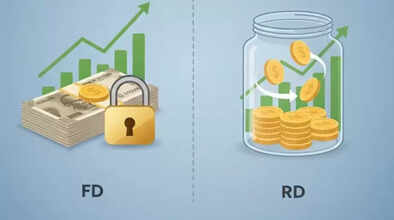Investment: Which is best for you, FD or RD? Which one offers guaranteed double profits? Find out...

To protect your hard-earned money, a variety of investment options are available in the market these days. Some people invest in stocks for quick profits, while for others, long-term investments, schemes like bank FDs and RDs are considered better options. Today, we'll learn about fixed deposits (FDs) and recurring deposits (RDs), their features, and which option will be better for you in which circumstances.
What is a Fixed Deposit (FD)?
An FD is an investment option in which you deposit a large sum of money in a bank and let it remain there for a fixed period. During this period, the bank pays you a fixed interest rate, providing you with a guaranteed return.
You can choose the term of an FD based on your needs. It can range from 7 days to 10 years. You get your entire money back, including interest, upon maturity. This is why FDs are considered a low-risk and safe investment.
Why is FD a popular choice?
Many people still choose fixed deposits because they offer fixed and guaranteed returns. Their tenure is also very flexible; you can invest for a period ranging from 7 days to 10 years. This is a risk-free investment, ensuring your money is safe. There are several options for receiving interest on FDs; you can choose monthly, quarterly, or at maturity.
Furthermore, for those planning to save tax, a tax-saving FD with a 5-year lock-in period is a good option. If needed, you can also take a loan against the FD. However, keep in mind that withdrawing money before maturity may incur penalties.
What is a Recurring Deposit (RD)?
RD is an excellent investment option for those who want to earn fixed returns by saving a small amount every month. In this scheme, you have to deposit a fixed amount in the bank every month, and when the term of the scheme is over, you receive interest on your deposit along with your savings. This is a particularly good option for those who don't have a large sum of money at once but want to save with discipline.
RD tenures can range from 6 months to 10 years. The interest rate is fixed, similar to that of an FD. It is also considered a safe and risk-free investment. However, if you close an RD before maturity, you receive lower interest and may also incur a penalty.
What are the similarities between FDs and RDs?
Both FDs and RDs are considered safe investments and offer fixed returns. The interest earned on both investments is taxable. If you wish, you can add a nominee to both schemes so that your family can easily access the money in case of an unforeseen event. If you withdraw the money prematurely, penalties may apply in both schemes.
Difference between FD and RD
In an FD, you deposit a large sum of money once, and interest accrues on the entire amount. In an RD, you make small monthly investments, and the interest increases as the deposit grows. In an FD, you can receive interest monthly or quarterly, while in an RD, interest and deposit are usually paid only upon maturity. While you can reinvest in an FD after maturity, it's essential to maintain regular RD.
Which option might be better for you?
If you have a large sum of money to deposit and want to invest for the long term, an FD is preferable because the interest rate may be slightly higher, and you can lock in the amount at once. However, if you prefer regular monthly savings and targeted investments, such as travel, education, or an emergency fund, an RD might be an option, as your balance grows based on your income.
Disclaimer: This content has been sourced and edited from TV9. While we have made modifications for clarity and presentation, the original content belongs to its respective authors and website. We do not claim ownership of the content.

